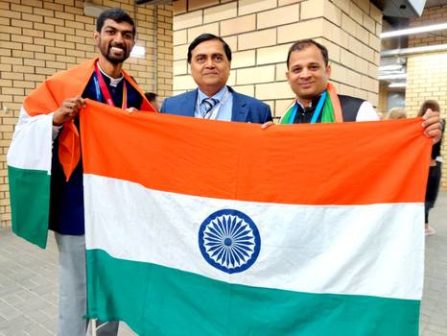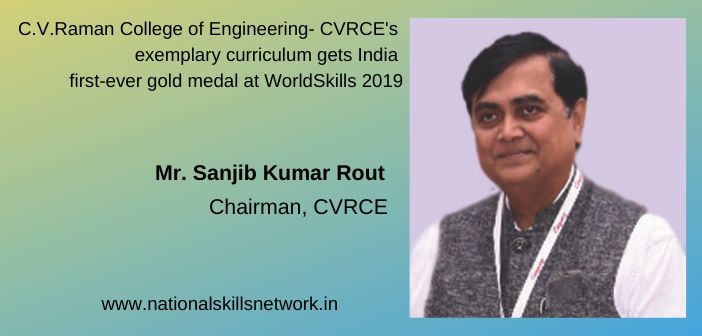Providing state-of-art technical education and moulding a new batch of budding engineers every year, C. V. Raman College of Engineering continues to stand as one of the premier institutes of technical education in Odisha. It is their innovative and industry-integrated curriculum along with Centres of Excellence(CoE) that created history for India in winning its first-ever gold medal in WorldSkills Kazan competition this year. To know and understand more about the aspirational value that the college is adding to skills such as plumbing, welding etc, we spoke to Mr. Sanjib Kumar Rout, Chairman, C. V. Raman College of Engineering (CVRCE) . The skill story unravels the institutional support needed to produce gold medalists like Aswatha Narayana who was coached by experts, Rajat Samantray from CVREC and international expert Mr Hugo Van Niekerk from South Africa
Q: Tell us about the commendable industry-academia collaboration at CVRCE in the form of COEs formed with so many industries.
A: It took us 14 years of dedication and hard work to establish the industry-academia interaction that you see in our institute today. Our agenda was to build an engineering college with complete industry partnership. We realised that to keep pace with changes in technology, curriculum has to change rapidly. If we had waited to change the curriculum as per the university criteria and then it would have taken 4 to 5 years. By the time the existing curriculum would be outdated.
Technologies like Automation, Artificial Intelligence, Robotics, Mechatronics were changing the structure of the academic curriculum. We took feedback from our alumni while making the changes. With the help of Bosch, Germany we set up our first Centre of Excellence (CoE) on Hydraulics and Pneumatics and PLCS. Once the CoE was established successfully, other industries like Festo, Siemens came on board to set up CoEs on higher version of PLCS and automation. This was followed by IT MNCs like Google.
Q: How has the curriculum helped students from CVRCE to make a mark at the international level?
A: Our idea here is to add future skills to the formal curriculum as these skills are a must-have for 21st century employability. These courses are not mandatory and students can choose them as their electives. This is how we build our curriculum to provide our students with the best possible engineering education. To help them bridge the industry-academia gap, we also facilitate them with internships in the last year. Today, wherever our students go, they are able to cope with the changing technology and they are appreciated. This is one of the reasons our college is ranked in NIRF among the top 100 colleges since last 4 years by MHRD.
We also encourage our students to participate in different hackathons. This year, we won 4 software hackathons and 2 hardware hackathons. Our students recently participated in Singapore-India international hackathon where one of our students stood in first position.
Winning is one aspect but the benefit that we are expecting through this is to build the startup ecosystem which is somewhat lacking today.

Today, our students have excelled in every domain, including WorldSkills. We have recorded our journey to the gold in WorldSkills in the form of a YouTube video to inspire others where the entire journey of last six years including all the hurdles and the different phases has been shown.
When we traditionally look at plumbing, welding in terms of skilling ecosystem, they are not at all aspirational as these are considered lowest level skills. We would like you to share your views on this particular aspect.
Skills like plumbing or welding are valued differently in developed countries like Germany. But in India the case is different. Unlike those countries we think plumbing as some manual low level skill where the plumbers only do the repairing work. Unfortunately, we don’t talk about the design aspect which is the main part of plumbing. The design of the entire water system and pipe lines of a newly constructed building is the responsibility of a civil engineer as a part of their plumbing skills. However, whenever I ask any civil engineer about this they don’t seem to have knowledge or skills in this area.
 It is high time we should make our students aware that plumbing is not about the repair work, It is about the design as well. Today’s plumbing is totally different from the olden days plumbing as it is all about automation and PLCs. As our students never had the exposure, they are lacking in this skill. As a result, companies are looking for talent from abroad. This needs to be changed. Not only for plumbing, we need to do the same for other skills as well.
It is high time we should make our students aware that plumbing is not about the repair work, It is about the design as well. Today’s plumbing is totally different from the olden days plumbing as it is all about automation and PLCs. As our students never had the exposure, they are lacking in this skill. As a result, companies are looking for talent from abroad. This needs to be changed. Not only for plumbing, we need to do the same for other skills as well.
People in other countries are recruited based on their skills and not for their degrees. But the case is reversed when it comes to India. We prefer degree above skills while recruiting. Our students should have hands-on skills. Competency with the right skills is highly essential for today’s youth. The time has come when the country should be driven with skills and not with degrees and certificates. Skills promote innovation which in turn will lead to entrepreneurship. So, we are seeding these ideas in the minds of aspiring youth.
Q: As you were talking about the success of these CoEs, do you have any criteria for going for new partnerships or looking at partnerships which has been successful?
A: We focus on the scope for employment, future skills and technology adoption in various industries. For example, for including drone technology in the curriculum, as drone licensing is not permitted in India, we are sending our faculty to Australia to provide training. Today the drone technology is not in the curriculum but in future it will be and industries will seek drone pilots with license. We are acquiring the entire curriculum, technology, equipment, train the trainer programs from countries like Russia, Moscow to set it up on our campus.\
Q: How is the response of the students for these future related subjects as it is not mandatory?
A: We have many initiatives to make these skills popular among students. We are currently conducting 30 programs related to future skills, both elective and mandatory. We invite industry experts, WorldSkills experts in different domain and organising workshops. They deliver talks about the future prospect of these skills. We have done this for IT, cloud computing and cybersecurity by inviting experts from NASSCOM. The students participated in huge numbers which shows their interest towards the future related subjects.
We have a newly formed department called “Skill Army”. Under this, one engineering graduate will be given a chance to master one skill where they will be trained with technical skills as well as other important skills like fitness, stress management, best practices and time management. The students have to compete with each other and the winner will be provided with the opportunity. They rest of the participants will also have some experience which will help them in future. The students are eagerly participating in this as till now 430 students have opted for Skill Army. We have selected 140 out of them.
Q: Would you like to tell us a bit about the WorldSkills Shanghai preparation?
A: We upgrade the CoEs as per the WorldSkills requirements. We are doing the same for Shanghai. We are upgrading our CoEs as per the Shanghai requirements. We are trying to procure the equipment to see that these students are trained at that level. We are also collaborating with most of the sector skill councils and other international trainers to provide the students the possible training. We have dedicated departments called “World Skill Academy” which work 24/7 for WorldSkills preparation.
To keep the spirit of the students in tact we try to put these students through different competitions. We have recently sent a team to participate in a competition happening on Water Technology (IFAT India 2019) and we are looking forward to send our students to some upcoming competitions on Welding. We think engaging students in different competitions nationally and internationally is highly essential to keep them motivated. Otherwise, the monotony of the training will gradually kill their interest.
Q: What is your message to the youth of India for a balanced technical education which has skills as well as knowledge both?
A: I would like to tell the youth that the future lies in skills. People will recruit you if you can perform and deliver. There are no more government jobs which may recruit on the basis of degrees. So whatever they study they have to master at least one skill of their choice. Skill is the only thing that will help them gain success in each and every aspect of their lives and it’ll keep their jobs secure. Because no company will want to lose a highly skilled employee!













Comments 5